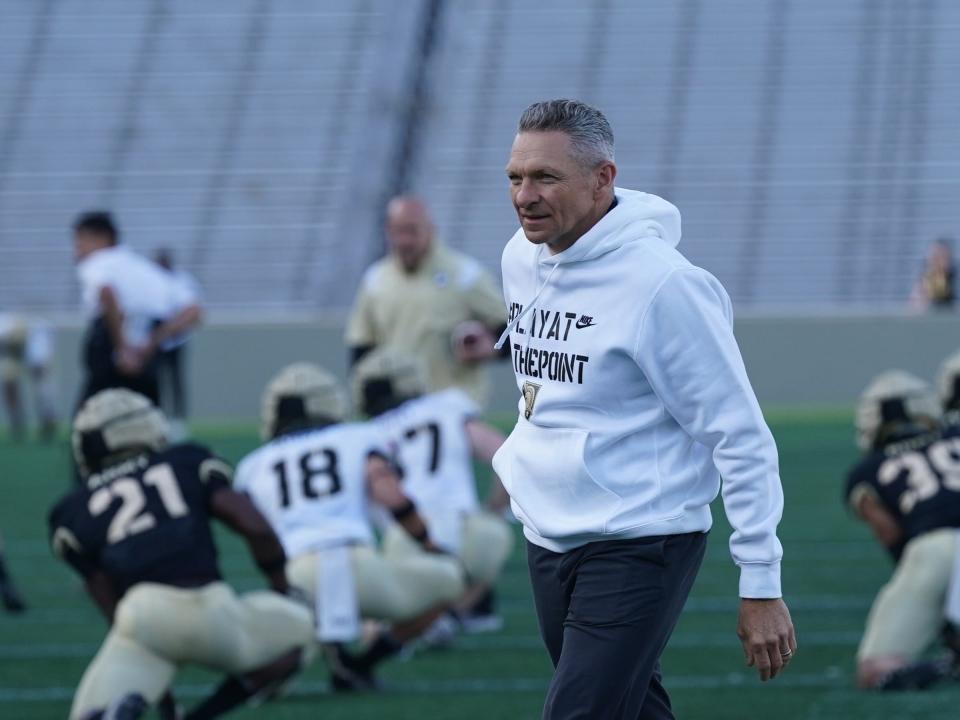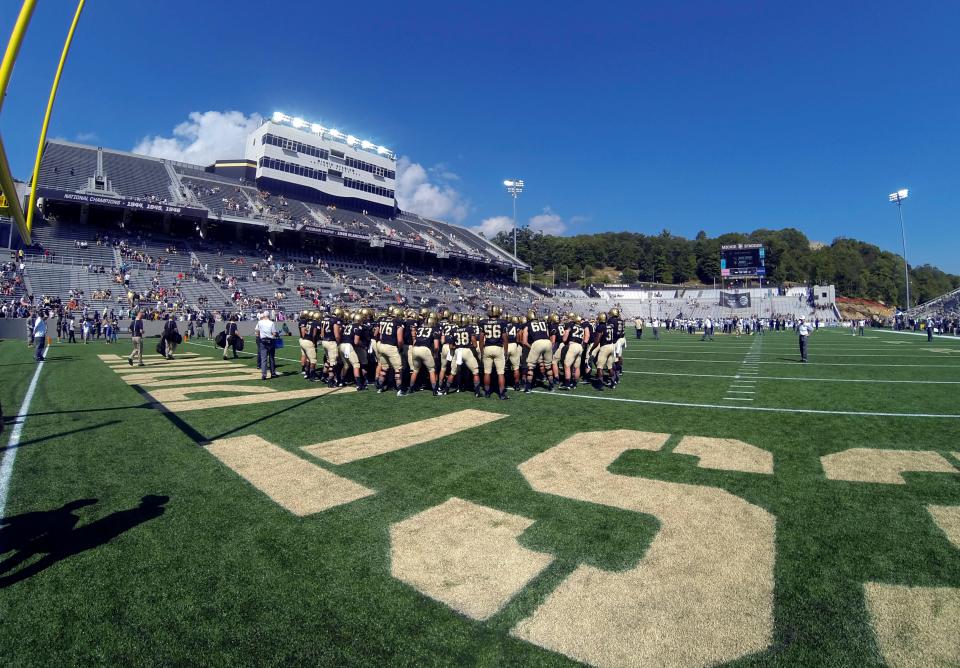Tramel's ScissorTales: College football nation mourns as Army scraps the triple option
Lower the flags to half staff. A nation mourns. Send for the trumpeter; it’s time to play Taps.
Army football is scrapping the flexbone.
The triple-option offense that derived from the Split T (OU 1950s) and the wishbone (OU and others 1970s) is about gone now. But Army, Air Force and Navy have kept it alive with enough success using precision execution and the element of surprise to keep bigger, stronger and faster defenses on their heels.
In perhaps the most stunning game in the century-long history of Owen Field, Army took the Sooners to overtime in 2018, before OU prevailed 28-21.
The Black Knights ran 87 plays to OU’s 40. Used up 44:41 of the game’s 60 minutes.
Army had only six possessions the entire game other than a half-ending, three-play drive. Four of those six possessions were at least 16 plays, at least 65 yards and at least 8:54 long in time.
The Black Knights used 39:18 — two thirds of the game — on only four possessions.
The Sooners were not alone in being run over by the infantry. Army took Michigan to overtime a year later.
Opposing coaches lived in fear of the Black Knights, knowing a total defensive makeover was due for that one week.
More: Where OU football, Oklahoma State land in Big 12 preseason media poll

But Army coach Jeff Monken has decided that the disadvantages now outweigh the advantages. He is installing a spread offense that still will use option principles, but without the triple-option elements you remember from the Bud Wilkinson/Barry Switzer days of college football.
No more fullback dive. No more quarterback-pitch option.
Instead, Army will go to the kind of offense you see every Saturday on virtually every campus. The run-pass option (RPO) for quarterbacks. The zone-read plays (what I call the shotgun option). The swing passes off zone reads.
“What Army and what the people associated with this institution expect, and who we represent, the men and women that serve, they expect victory,” Monken told Sports Illustrated. “The American people expect the Army, when they go to fight, they expect them to win. They don’t care how they do it.
“They haven’t decreased the number of years that our football players have to serve in the military because we’ve won games. They aren’t making classes easier. They don’t say, ‘Now that you’ve won, we know we want to make it easier for you to get that recruiting pool much bigger, so we make classes easier and we’ve come up with these three majors that the guys can get into and they can breeze through. Don’t have to wear (military) uniforms anymore. They don’t have to get up early in the morning for formation.’ All those still exist.”
The primary reason for Monken’s decision was a 2022 rule change that outlawed blocking below the waist outside the tackle box. Overnight, a major tactic of the flexbone was gone.
No more of offensive tackles looping around to cut a linebacker trying to get outside. No more of a fullback darting out of the line of scrimmage without the ball and cutting an approaching safety. No more of the slotback, the lead blocker on the perimeter, cutting a cornerback.
Physically manhandling bigger, stronger, faster players is not likely in the open field. Walling off such defenders is difficult. Army’s option was severely curtailed.
Monken expects recruiting to improve. For decades, coaches have recruited against option-oriented teams, saying they are a roadblock to the National Football League. Of course, playing at a service academy in the first place is a roadblock to the NFL.
More: Tramel: Will Brent Venables' $175M dream facility for OU football get built?

But Monken hopes to entice more talented players to West Point. Maybe even get quarterbacks who want to attend a service academy but weren’t fit for flexbone-type offenses.
And while yes, Army has played mind games with opposing defensive coordinators for decades, it occasionally came at a cost. The Black Knights rarely knew how a defense might counter the Army option.
And whatever advantages Army had in the schematic game, it was not an advantage against Navy. And Army and Navy in many ways really do play a one-game season.
Army has been running tradition triple-option style offenses for decades. But the Black Knights went away from such a scheme when they hired Todd Berry after the 1999 season. In four years, Berry went 5-35.
But Monken is undeterred.
“In World War I, it was trench warfare, and, I mean, that’s combative and brutal,” Monken told SI. “By World War II, we got aircraft carriers and hand grenades and we’re fighting the world a little bit differently. And in 2023, I mean, we’ve got all kinds of technology and weapons that we’re never dreamed of.
“People aren’t clamoring for us to go back to trench warfare. Find a way to win.”
This is Monken’s gig. He knows better than we do how to win games in West Point.
But it still seems sad. Sound the trumpet for the Army flexbone.
More: Tramel: Who can fix college football's weak scheduling? Playoff committee holds the power
The List: Pre-Saturday openers
College football’s Week 1 begins eight weeks from today. Seven Week 0 games are scheduled, but none are much compelling.
Both OU and OSU open on September 2, a Saturday, giving Cowboy and Sooner fans the freedom to watch the pre-Saturday openers in Week 1. Here are the 10 best games being played on Thursday, August 31, or Friday, September 1:
1. Florida at Utah: A big showdown on ESPN. Not much is expected out of the Gators, but they upset the Utes a year ago.
2. Nebraska at Minnesota: The Cornhuskers’ Matt Rhule era begins in Minneapolis.
3. Louisville at Georgia Tech: The Yellow Jackets finished strong in 2022, but much is expected out of Louisville and new coach Jeff Brohm.
4. North Carolina State at Connecticut: Jim Mora Junior did a great job giving UConn a pulse last season. Can the Huskies spring a surprise on the Wolfpack?
5. Kent State at Central Florida: A compelling game for Big 12 fans – a sneak peak at what awaits the conference as the Knights now are members.
More: Who has college football's toughest nonconference schedule among Power Five teams?
Mailbag: James Harden
James Harden has been gone from Oklahoma City almost 11 years, but the specter of his trade in October 2012 remains.
Shannon: “With the passing of each season, we receive more evidence that the Sam Presti criticism for his handling of Harden is unfounded, or at least overstated. Harden wanted his own team. It wasn't about $5M. He was not above tanking his team. At least he hasn't been in his 'mature' years. Regardless, here's my question: wouldn't it have made more sense for James to sign the $$$ contract he desires with a 'cap team' with the understanding they would trade him to a desired destination when trade eligible? It seems most 'cap teams' would be amenable to trading him for draft picks and/or a solid young player. As opposed to Philly, who is trying to trade him for 'win now' players. Where does that fall apart — the willingness of 'cap teams' to participate, Harden's patience, Harden's belief in (Daryl) Morey's commitment to taking care of him, all of the above? When I have thoughts like this, my first response is 'there are a lot of smart people involved so I'm missing something', but I can't shake this one. So I turn to you.”
Tramel: One of the unpleasantries of NBA player movement in recent years has been the desire of superstars to double dip – signing a max- or near-max contract, giving them financial security, but then demanding a trade to the locale of their choice. They are indeed trying to have it both ways.
Paul George was a prime example. Kevin Durant, too. Damian Lillard is the current poster child.
But Harden is a little different than Durant and Lillard and whoever else is in the sign-long-term-then-demand-a-trade club.
That club is attractive to potential teams because it assures they will have you for awhile. That financial security for the player also provides security for the team (in theory, at least).
But who wants Harden for awhile? He's old (turns 34 next month) and declining relatively fast. His value is in the now. What he can do now? In 2025-26, if you're paying Harden a bunch of money, that's a problem. That's why I think Harden knew if he signed long-term with Philly, he would be a Sixer.
Not signing the extension gives him the best chance to go elsewhere.
Berry Tramel: Berry can be reached at 405-760-8080 or at btramel@oklahoman.com. He can be heard Monday through Friday from 4:40-5:20 p.m. on The Sports Animal radio network, including FM-98.1. Support his work and that of other Oklahoman journalists by purchasing a digital subscription today.
This article originally appeared on Oklahoman: Army football coach Jeff Monken scrapping the triple option flexbone

